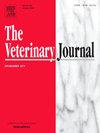The role of mentorship in veterinary practice: An empirical study of the Animal Health Mentoring Framework in Pakistan
IF 3.1
2区 农林科学
Q1 VETERINARY SCIENCES
引用次数: 0
Abstract
This research introduced and ascertained the effectiveness of the Animal Health Mentoring Framework (AHMF) designed by Brooke, a global welfare organization, to develop the dual skills of ethical reasoning and the technical capabilities of field veterinarians in Pakistan. A longitudinal observational study was carried out on 100 veterinary professionals from six institutions in Lahore for six months by engaging them in a structured mentorship program. The AHMF targeted key developmental areas: welfare advocacy, clinical expertise, communication, kit content and maintenance, and clinical governance. Monthly assessments were carried out using the AHMF scoring tool, and the results were analyzed using the Friedman test across these five competencies. The results showed statistically significant improvements in all aspects. The welfare advocacy score increased from 1.13 at the start to 3.62 by the end of the study, clinical expertise improved from 8.26 to 12.51 while clinical governance enhanced from 0.14 to 1.12. Communication skills and kit management also improved significantly, although at a slightly slower rate. The average total AHMF score of the participants increased from 13.14 to 22.37, thus emphasizing all-rounded improvements in veterinary practices. The outcomes suggest that formal mentoring through the AHMF significantly enhances veterinary professionals' ethical and technical competencies, particularly in resource-poor settings. AHMF is a scalable, globally adaptable model, that can improve veterinary education, practice, and animal welfare, particularly in low and middle-income countries. This pioneering research sets a benchmark for professional development and offers a practical solution to elevate animal welfare and clinical expertise globally.
指导在兽医实践中的作用:巴基斯坦动物健康指导框架的实证研究。
这项研究介绍并确定了全球福利组织Brooke设计的动物健康指导框架(AHMF)的有效性,该框架旨在培养巴基斯坦现场兽医的道德推理和技术能力的双重技能。对来自拉合尔6个机构的100名兽医专业人员进行了为期6个月的纵向观察研究,让他们参与了一个结构化的指导计划。AHMF的目标是关键的发展领域:福利宣传、临床专业知识、沟通、工具包内容和维护以及临床治理。使用AHMF评分工具进行月度评估,并使用Friedman测试对这五种能力进行分析。结果显示各方面均有统计学意义上的显著改善。福利倡导得分从研究开始时的1.13分提高到研究结束时的3.62分,临床专业知识从8.26分提高到12.51分,临床治理从0.14分提高到1.12分。沟通技巧和装备管理也有显著提高,尽管速度略慢。参与者的平均AHMF总分从13.14分增加到22.37分,从而强调了兽医实践的全面改进。结果表明,通过AHMF进行的正式指导可显著提高兽医专业人员的道德和技术能力,特别是在资源贫乏的环境中。AHMF是一种可扩展的、适用于全球的模式,可以改善兽医教育、实践和动物福利,特别是在低收入和中等收入国家。这项开创性的研究为专业发展树立了基准,并为提高全球动物福利和临床专业知识提供了实用的解决方案。
本文章由计算机程序翻译,如有差异,请以英文原文为准。
求助全文
约1分钟内获得全文
求助全文
来源期刊

Veterinary journal
农林科学-兽医学
CiteScore
4.10
自引率
4.50%
发文量
79
审稿时长
40 days
期刊介绍:
The Veterinary Journal (established 1875) publishes worldwide contributions on all aspects of veterinary science and its related subjects. It provides regular book reviews and a short communications section. The journal regularly commissions topical reviews and commentaries on features of major importance. Research areas include infectious diseases, applied biochemistry, parasitology, endocrinology, microbiology, immunology, pathology, pharmacology, physiology, molecular biology, immunogenetics, surgery, ophthalmology, dermatology and oncology.
 求助内容:
求助内容: 应助结果提醒方式:
应助结果提醒方式:


